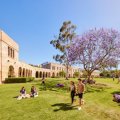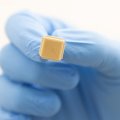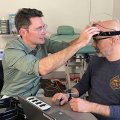Embargoed until 10am July 6, 2010
A University of Queensland researcher has received a prestigious Australian Research Council Laureate Fellowship to conduct a series of field experiments testing the effectiveness of Third Party policing.
This policing approach involves police partnering with communities, businesses and other government agencies to use regulations and civil laws to better control crime.
The experiments will be part of an international trial being conducted simultaneously around the world with different populations.
It is believed to be the first time coordinated trials of a criminal justice intervention will run in the world.
“The significant funding from the ARC Laureate Fellowship will enable Australia to participate in the trial,” Laureate Fellow Professor Lorraine Mazerolle said.
“Our international research partners will include Cambridge University, Hebrew University in Israel and George Mason University in the US.”
Professor Mazerolle of UQ’s Institute for Social Science Research, who will lead the Australian team conducting the research, will receive her fellowship tomorrow in Cairns from the Minister Industry, Science and Research Senator Kim Carr.
Professor Mazerolle is among 15 Australian Laureate Fellows announced in round two of the scheme, with each fellowship valued at up to $3.1 million over five years.
Each Australian Laureate Fellow leads and mentors a team of postdoctoral and postgraduate researchers, building Australia's next generation of research leaders and increasing its research capacity.
Professor Mazerolle said she believed one of the reasons the fellowship had been awarded was that her program of research had already attracted researchers of the calibre of experimental criminologist Dr Sarah Bennett,of Cambridge University, who last year was awarded a prize for Young Experimental Criminologist of the Year.
She said the first of the randomized trials, likely to begin in 2011, would target truant children in Queensland, and would be conducted in conjunction with Queensland Police, particularly in the Oxley District, the Education Department and Department of Communities.
Professor Mazerolle is also the Foundation Director for the Australian Research Council Centre of Excellence in Policing and Security (CEPS). Her research interests include experimental criminology, crime control/crime prevention, ecology of crime and urban criminological theories.
Her project will aim to institutionalise the use of scientific experimental evidence to guide crime control policies, and help safeguard and protect Australian from terrorism and crime.
Professor Mazerolle obtained her PhD in Criminology and Criminal Justice from Rutgers University in the United States. She is a Fellow of the Academy of Experimental Criminology and is the current Academy President.
Professor Mazerolle is one of the founding members of the newly formed Division of Experimental Criminology within the American Society of Criminology. She is an Associate Editor for the Journal of Experimental Criminology and the Journal of Quantitative Criminology.
She has published articles in the Journal of Experimental Criminology, Criminology, Criminology and Public Policy, Evaluation Review, and Justice Quarterly and is the author of a number of books including Third Party Policing (Cambridge University Press) and Policing Places with Drug Problems (Sage).
She has won the Rutgers University Distinguished Alumni Recognition Award. Professor Mazerolle was a delegate at the Australia 2020 Summit in - 2008.
UQ Deputy Vice-Chancellor (Research) Professor Max Lu congratulated Professor Mazerolle on the award of her prestigious fellowship.
“Professor Mazerolle is UQ’s third ARC Laureate Fellow and joins Professor Jennifer Martin of the UQ Institute for Molecular Bioscience and Professor Peter Mumby of the UQ School of Biological Sciences who were announced as ARC Laureate Fellows in the first round last year,” he said.
Media: For project information contact Australian Laureate Fellow Professor Lorraine Mazerolle—0410 289 745 or Jan King at UQ Communications 0413 601 248
.jpg)









